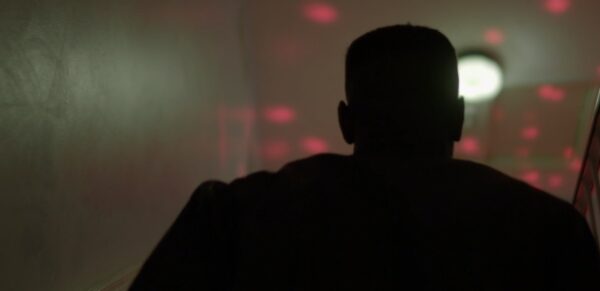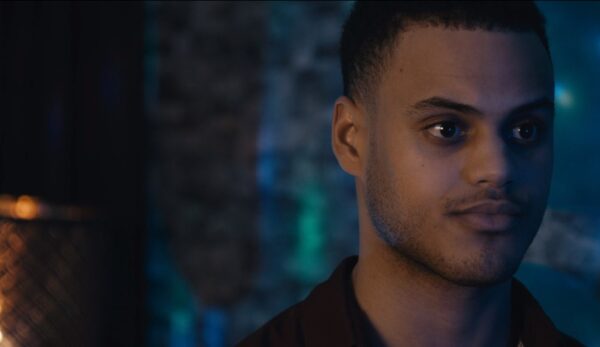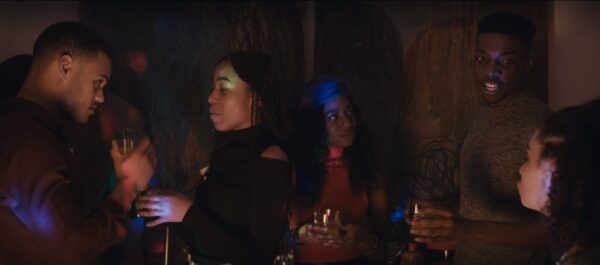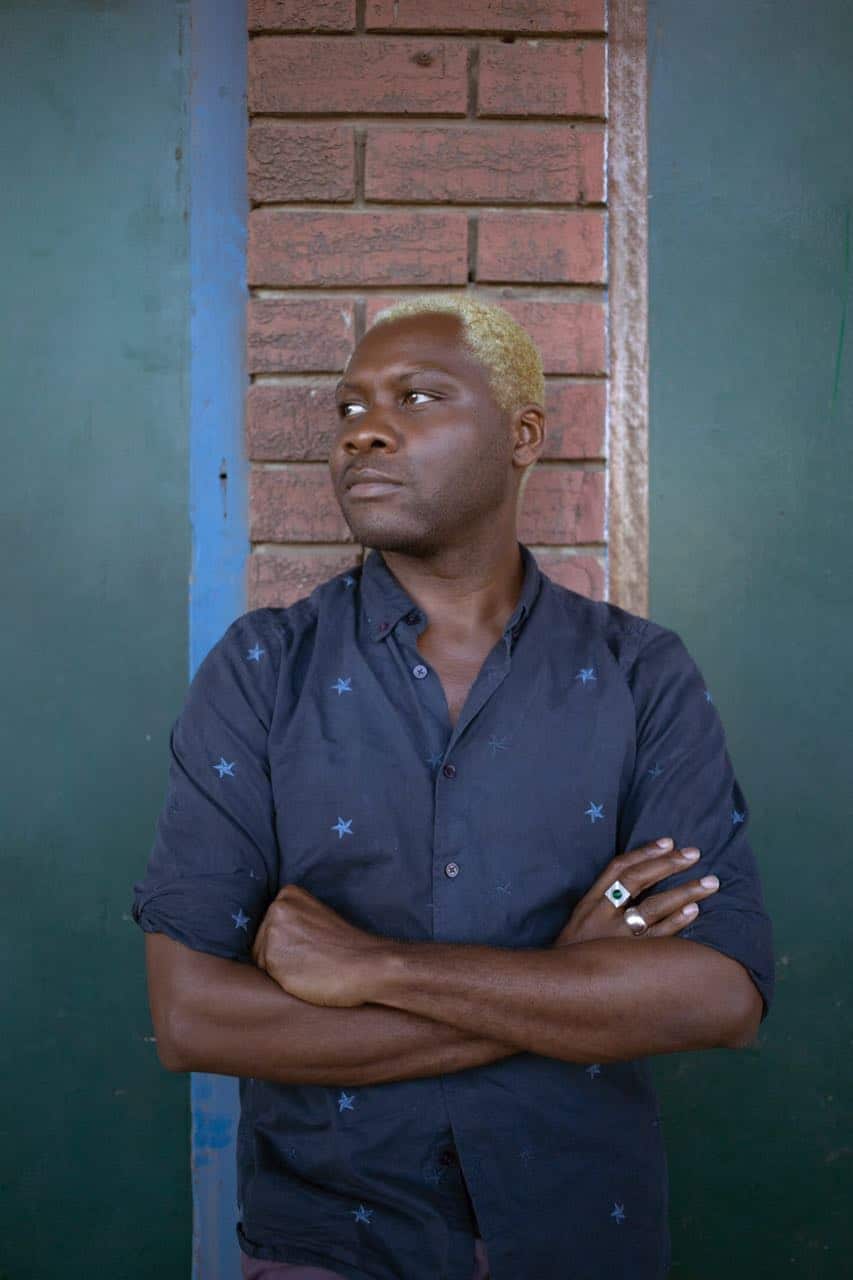Best British – 46
The Iris Blogger talks to filmmaker Joseph A. Adesunloye about his nominated short film.
Born in Lagos, Nigeria, Joseph A. Adesunloye is the director of two feature films and five shorts, the latest of which,
46, has been shortlisted for the Best British award, sponsored by Pinewood Studios. He talked to the Iris Blogger about his career and this powerful film.
IRIS BLOGGER: Where did the idea for
46 come from?
JOSEPH ADESUNLOYE: Years ago, I was aware of an incident that happened to someone I knew, and it was in a very surprising setting where we’d never expect it and that stayed with me. That’s loosely what
46 is based on. But it was actually years later that the story came to me in flashes. I was sitting in my hotel room in South Africa, where I went to premiere my previous feature film White Colour Black, back in 2016. The first few scenes of the film flashed as images in my mind very vividly and I quickly wrote them down. And I began to develop the story from there.
 IB:
IB: We're used to seeing stories from a victim's point of view, but
46 turns that on its head, causing us to question our sympathies. Without giving too much away, was that a conscious decision?
JA: Yes. It was a conscious decision that I didn’t want the character to be considered a “monster” because that would be too easy, neither did I want to excuse him, but I wanted the audience to reflect and think on what they were witnessing and not be able to just dismiss it or him, I had to make sure he wasn’t a caricature. Also, when we were making the film and working the material, we had lengthy discussions about how to play such a character in a way that didn’t draw too much empathy but also didn’t repel an audience.
IB: 46 plays on the trope of a gay man fancying his straight friend, which we've seen in many gay stories, and uses that provocatively. Would you have felt confident or comfortable telling this story in a straight context?
 JA:
JA: First off, let me start by saying I don’t see the character of Luke as necessarily ‘gay’. In my mind he’s a person who happens to be very infatuated with his best friend who happens to be a man. This was a way to question whether you can have desire and attraction that is so strong, so pervasive that it drives him into territory he may otherwise never have found himself in. So yes, I would have been comfortable telling the story in a ‘straight’ context.
IB: The film ends with a degree of ambiguity; we don't find out the long-term consequences of what's taken place. Are you happy to end it there, or do you see it as part of a bigger story that you might come back to?
JA: While in the world of the short I was happy to end it there, for me the story needed to sit and unfold in a bigger context, and it’s expanded upon in my new feature film
Faces, in which it is one of four narratives.
IB: Almost a third of the films on this year’s Best British shortlist are either from or about the black community. As a filmmaker, does this feel like a "moment" for black British cinema, or is it more a case that it’s finally getting a spotlight?
 JA:
JA: I think to the rest of the world it might feel like a "moment", but I think black people have always told stories, it’s just that the rest of the world weren’t very interested in listening to those stories in my opinion. Talented black creatives have always existed. They may never have received the same institutional support or recognition as white creatives, but they have been fighting for a long time with very little resources determined to carve out their own space and voices. So, I am glad the rest of the world is finally beginning to take some notice, but we have a long way to go to before have true equitability.
---
You can follow Joseph on
Instagram and
Twitter.  IB: We're used to seeing stories from a victim's point of view, but 46 turns that on its head, causing us to question our sympathies. Without giving too much away, was that a conscious decision?
JA: Yes. It was a conscious decision that I didn’t want the character to be considered a “monster” because that would be too easy, neither did I want to excuse him, but I wanted the audience to reflect and think on what they were witnessing and not be able to just dismiss it or him, I had to make sure he wasn’t a caricature. Also, when we were making the film and working the material, we had lengthy discussions about how to play such a character in a way that didn’t draw too much empathy but also didn’t repel an audience.
IB: 46 plays on the trope of a gay man fancying his straight friend, which we've seen in many gay stories, and uses that provocatively. Would you have felt confident or comfortable telling this story in a straight context?
IB: We're used to seeing stories from a victim's point of view, but 46 turns that on its head, causing us to question our sympathies. Without giving too much away, was that a conscious decision?
JA: Yes. It was a conscious decision that I didn’t want the character to be considered a “monster” because that would be too easy, neither did I want to excuse him, but I wanted the audience to reflect and think on what they were witnessing and not be able to just dismiss it or him, I had to make sure he wasn’t a caricature. Also, when we were making the film and working the material, we had lengthy discussions about how to play such a character in a way that didn’t draw too much empathy but also didn’t repel an audience.
IB: 46 plays on the trope of a gay man fancying his straight friend, which we've seen in many gay stories, and uses that provocatively. Would you have felt confident or comfortable telling this story in a straight context?
 JA: First off, let me start by saying I don’t see the character of Luke as necessarily ‘gay’. In my mind he’s a person who happens to be very infatuated with his best friend who happens to be a man. This was a way to question whether you can have desire and attraction that is so strong, so pervasive that it drives him into territory he may otherwise never have found himself in. So yes, I would have been comfortable telling the story in a ‘straight’ context.
IB: The film ends with a degree of ambiguity; we don't find out the long-term consequences of what's taken place. Are you happy to end it there, or do you see it as part of a bigger story that you might come back to?
JA: While in the world of the short I was happy to end it there, for me the story needed to sit and unfold in a bigger context, and it’s expanded upon in my new feature film Faces, in which it is one of four narratives.
IB: Almost a third of the films on this year’s Best British shortlist are either from or about the black community. As a filmmaker, does this feel like a "moment" for black British cinema, or is it more a case that it’s finally getting a spotlight?
JA: First off, let me start by saying I don’t see the character of Luke as necessarily ‘gay’. In my mind he’s a person who happens to be very infatuated with his best friend who happens to be a man. This was a way to question whether you can have desire and attraction that is so strong, so pervasive that it drives him into territory he may otherwise never have found himself in. So yes, I would have been comfortable telling the story in a ‘straight’ context.
IB: The film ends with a degree of ambiguity; we don't find out the long-term consequences of what's taken place. Are you happy to end it there, or do you see it as part of a bigger story that you might come back to?
JA: While in the world of the short I was happy to end it there, for me the story needed to sit and unfold in a bigger context, and it’s expanded upon in my new feature film Faces, in which it is one of four narratives.
IB: Almost a third of the films on this year’s Best British shortlist are either from or about the black community. As a filmmaker, does this feel like a "moment" for black British cinema, or is it more a case that it’s finally getting a spotlight?
 JA: I think to the rest of the world it might feel like a "moment", but I think black people have always told stories, it’s just that the rest of the world weren’t very interested in listening to those stories in my opinion. Talented black creatives have always existed. They may never have received the same institutional support or recognition as white creatives, but they have been fighting for a long time with very little resources determined to carve out their own space and voices. So, I am glad the rest of the world is finally beginning to take some notice, but we have a long way to go to before have true equitability.
---
You can follow Joseph on Instagram and Twitter.
JA: I think to the rest of the world it might feel like a "moment", but I think black people have always told stories, it’s just that the rest of the world weren’t very interested in listening to those stories in my opinion. Talented black creatives have always existed. They may never have received the same institutional support or recognition as white creatives, but they have been fighting for a long time with very little resources determined to carve out their own space and voices. So, I am glad the rest of the world is finally beginning to take some notice, but we have a long way to go to before have true equitability.
---
You can follow Joseph on Instagram and Twitter. 
